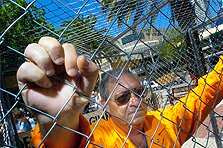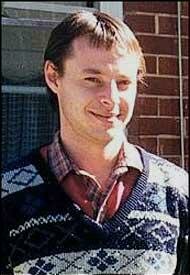|
HUMAN RIGHTS FOR EACH PERSON REGARDLESS OF AGE, RACE, RELIGION OR POLITICS
|

|
|
|

|
|
LATEST NEWS
|
|
Govt rejects advice to bring back Hicks
|
Sunday Jul 2 18:38 AEST 
Foreign Minister Alexander Downer has told NSW's top prosecutor to mind his own business after he demanded the government take action to bring terror suspect David Hicks back to Australia.
The Australian government is disinclined to bring Hicks home after America's highest court found last week that the military commissions set to try the Australian and other "enemy combatants" were unlawful.
The ruling means that Hicks and the other detainees awaiting military commission may now be tried by a traditional military court martial or through the US civilian courts.
NSW Director of Public Prosecutions (DPP) Nicholas Cowdery said there was no excuse for the government not to act to bring Hicks home.
"The Australian government should have acted a long time ago, but surely they don't need any further impetus to cause them to act now," he said.
"Just as the (British) nationals were released and taken back to England and are now living in the community, so Hicks should be brought back to Australia and appropriate arrangements made under Australian law for whatever should happen to him back in the community in Australia."
But Mr Downer was unwilling to listen to Mr Cowdery's advice, saying he should keep out of politics.
"He should concentrate on ... law and order in NSW - that's where his responsibilities lie," he said.
"He's always got something to say about every political issue under the sun, but our position is these are very serious, very grave charges that have been laid against David Hicks and he should face those charges in court."
Hicks, who was captured fighting with Taliban forces in late 2001, has been held at Guantanamo Bay in Cuba for more than four years without trial.
Mr Cowdery described the US military prison as a "black hole" for the 600 or so detainees held there.
"These people have not been treated according to the rule of law, but according to the rule of (US President George W) Bush and his cronies," he said.
Hicks is accused of having trained with al-Qaeda and has pleaded not guilty to charges of conspiracy, attempted murder and aiding the enemy.
Mr Downer said the charges against Hicks were very serious and needed to be heard in a court of law.
"Where somebody has been involved with training with al-Qaeda and has faced very serious charges, we think that person should face those charges in a court of law," he told the Ten Network.
"Some people are saying, `Well, Hicks should just be released and let off into the Australian community.'"
"This is somebody who has trained with al-Qaeda, who's been up before, if you like, been up before charges of conspiracy to commit war crimes and attempted murder, and I do think they are very grave charges, and it's our preference that in those circumstances that Hicks be brought before a court of law."
Prime Minister John Howard urged the US to find another forum to try Hicks.
©AAP 2006
- David Hicks Case Information
|
|
Hicks would be jailed here
|
|
From: AAP June 29, 2006
TERRORIST suspect David Hicks would serve any jail sentence he was given in Australia, the Federal Government said today.
Justice Minister Chris Ellison said Australia had brokered a prisoner transfer agreement with the United States about Hicks, who is being held at Guantanamo Bay in Cuba.
Adelaide-born Hicks has been detained by the US since his capture among Taliban forces in Afghanistan in late 2001.
Hicks, who is facing the prospect of trial by military commission, has pleaded not guilty to charges of attempted murder, aiding the enemy and conspiracy.
Senator Ellison said Hicks would serve in Australia any jail term he was handed.
"In the event that he was imprisoned as a result of the charges against him, I can say that agreement has now been reached for a transfer of prisoner arrangement in relation to David Hicks," he said in Adelaide.
"This is something we have been negotiating for some time and I can confirm that we do now have an agreement in place for Mr Hicks to be transferred to Australia in the event that he was imprisoned for a period of time."
Hicks is nervously awaiting a landmark ruling by the highest US court, involving another Guantanamo inmate, Salim Ahmed Hamdan, a Yemeni national accused of being the personal driver of al-Qaeda leader Osama bin Laden.
Hamdan has challenged the legality of the military commissions set up by the US Government to prosecute Hamdan, Hicks and other Guantanamo prisoners.
The Supreme Court's decision is a landmark test case that will have serious ramifications for Hicks and other terror accused.
If the US Government is victorious and the court rules the military commissions are legal, Hicks's military commission proceedings will probably reopen.
If the Supreme Court rules the military commissions are illegal, Hicks and other Guantanamo inmates would still probably be prosecuted, but in the US civilian court system or a traditional military court martial.
The court is expected to make its ruling within days.
- David Hicks Case Information
|
High Court Rejects Detainee Tribunals
5 to 3 Ruling Curbs President's Claim Of Wartime Power
|
|
By Charles Lane - Washington Post Staff Writer - Friday, June 30, 2006
The Supreme Court yesterday struck down the military commissions President Bush established to try suspected members of al-Qaeda, emphatically rejecting a signature Bush anti-terrorism measure and the broad assertion of executive power upon which the president had based it.
Brushing aside administration pleas not to second-guess the commander in chief during wartime, a five-justice majority ruled that the commissions, which were outlined by Bush in a military order on Nov. 13, 2001, were neither authorized by federal law nor required by military necessity, and ran afoul of the Geneva Conventions.
As a result, no military commission can try Salim Ahmed Hamdan, the former aide to Osama bin Laden whose case was before the justices, or anyone else, unless the president does one of two things he has resisted doing for more than four years: operate the commissions by the rules of regular military courts-martial, or ask Congress for specific permission to proceed differently.
"[I]n undertaking to try Hamdan and subject him to criminal punishment, the Executive is bound to comply with the Rule of Law that prevails in this jurisdiction," Justice John Paul Stevens wrote in the majority opinion.
While the decision addressed only military commissions, legal analysts said its skeptical view of presidential power could be applied to other areas such as warrantless wiretapping, and that its invocation of the Geneva Conventions could pave the way for new legal claims by detainees held at the military facility in Guantanamo Bay, Cuba.
The ruling shifts the spotlight to Congress, whose members face reelection this fall and who have largely avoided the military commission issue since the Sept. 11, 2001, attacks because of its political uncertainties. The invitation for the president to turn to Congress was extended in a short concurring opinion by one of the justices in the majority, Stephen G. Breyer, who made it clear that the concerns of critics had penetrated deeply at the court.
"Where, as here, no emergency prevents consultation with Congress, judicial insistence upon that consultation does not weaken our Nation's ability to deal with danger. To the contrary, that insistence strengthens the Nation's ability to determine -- through democratic means -- how best to do so," Breyer wrote.
"The Constitution places its faith in those democratic means," Breyer concluded. "Our Court today simply does the same."
Joining Stevens and Breyer in the majority were Justices Anthony M. Kennedy, David H. Souter and Ruth Bader Ginsburg.
Perhaps the only silver lining for the administration was that the decision did not affect the government's authority to keep terrorism suspects at Guantanamo Bay or elsewhere, a point Bush emphasized in his reaction. "We take the findings seriously," he said. "The American people need to know that this ruling, as I understand it, won't cause killers to be put out on the street."
But the court's action was clearly a setback for the White House. At the high court, its approach to the war on terrorism has suffered the broadest in a series of defeats, and the administration has been sent back to the drawing board in dealing with hundreds of suspected members of the Taliban and al-Qaeda -- at a time when international pressure is mounting to shut down Guantanamo Bay.
This is not the situation the president envisioned when he unveiled the military commissions as a tough-minded alternative to the civilian trials that the Clinton administration had used against terrorists. As first outlined in 2001, the commissions did not give defendants a presumption of innocence or guarantee a public trial.
- David Hicks Case Information
|
|
Supreme Court Blocks Bush, Gitmo War Trials
|
By GINA HOLLAND
The Supreme Court ruled Thursday that President Bush overstepped his authority in ordering military war crimes trials for Guantanamo Bay detainees.
The ruling, a rebuke to the administration and its aggressive anti-terror policies, was written by Justice John Paul Stevens, who said the proposed trials were illegal under U.S. law and international Geneva conventions.
The case focused on Salim Ahmed Hamdan, a Yemeni who worked as a bodyguard and driver for Osama bin Laden. Hamdan, 36, has spent four years in the U.S. prison in Cuba. He faces a single count of conspiring against U.S. citizens from 1996 to November 2001.
Two years ago, the court rejected Bush's claim to have the authority to seize and detain terrorism suspects and indefinitely deny them access to courts or lawyers. In this follow-up case, the justices focused solely on the issue of trials for some of the men.
The vote was split 5-3, with moderate Justice Anthony M. Kennedy joining the court's liberal members in ruling against the Bush administration. Chief Justice John Roberts, named to the lead the court last September by Bush, was sidelined in the case because as an appeals court judge he had backed the government over Hamdan.
Thursday's ruling overturned that decision.
Bush spokesman Tony Snow said the White House would have no comment until lawyers had had a chance to review the decision. Officials at the Pentagon and Justice Department were planning to issue statements later in the day.
The administration had hinted in recent weeks that it was prepared for the court to set back its plans for trying Guantanamo detainees.
The president also has told reporters, "I'd like to close Guantanamo." But he added, "I also recognize that we're holding some people that are darn dangerous."
The court's ruling says nothing about whether the prison should be shut down, dealing only with plans to put detainees on trial.
"Trial by military commission raises separation-of-powers concerns of the highest order," Kennedy wrote in his opinion.
The prison at Guantanamo Bay, erected in the months after the Sept. 11, 2001, terror attacks on the United States, has been a flash point for international criticism. Hundreds of people suspected of ties to al-Qaida and the Taliban - including some teenagers - have been swept up by the U.S. military and secretly shipped there since 2002.
Three detainees committed suicide there this month, using sheets and clothing to hang themselves. The deaths brought new scrutiny and criticism of the prison, along with fresh calls for its closing.
- David Hicks Case Information
|
|
CLICK HERE TO RETURN TO THE NEWS PAGE
|
|
|
FREEDOM IS A RIGHT OF ALL HUMAN BEINGS IN A WORLD WHERE LIFE IS VALUED AND PEACE MAY FINALLY BE A POSSIBILITY
|
|
|
|
|

|
|
Just in case you forgot - read the Universal declaration of Human Rights
|
|
|







